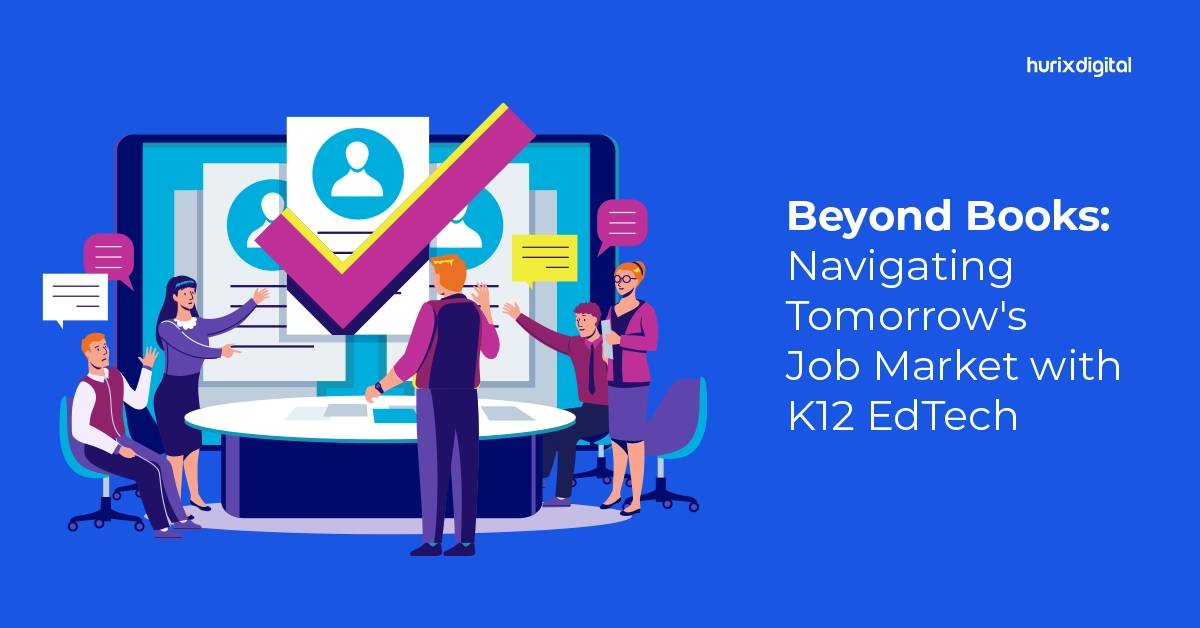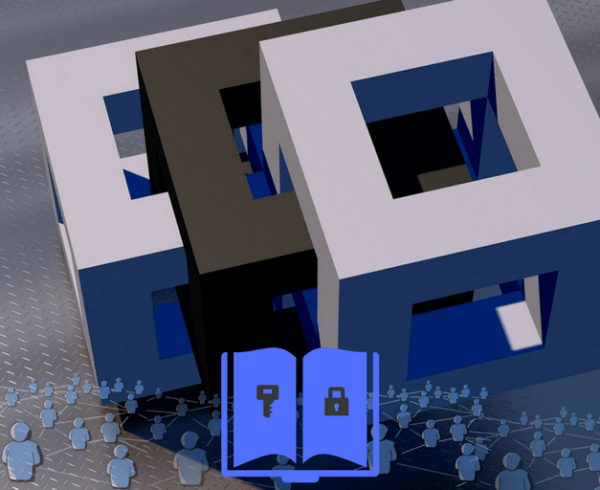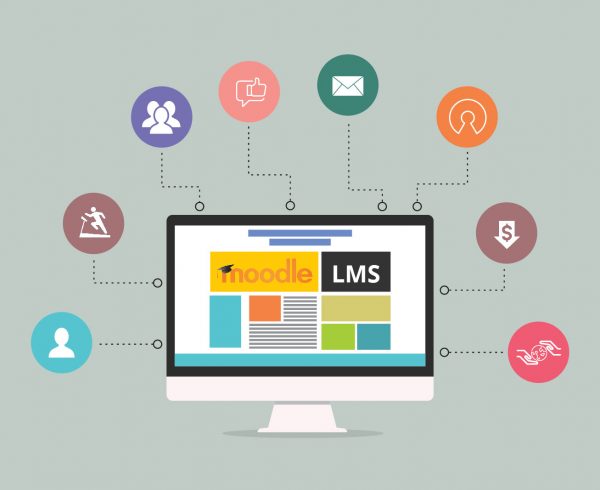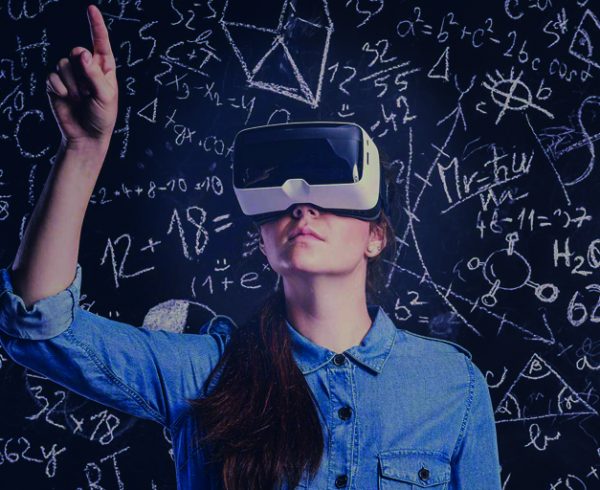Summary
This blog explores the power of K12 EdTech to cultivate digital literacy, enhance learning, promote STEM education, and prepare students for the evolving workforce. It highlights key trends like personalized learning, gamification, VR/AR, and data analytics that are transforming modern education.
Imagine a classroom where technology is not just a tool but a partner in learning. A dynamic setting where you can equip young learners for the challenges and opportunities of the future. That’s the vision of K12 EdTech – a game-changer in modern education.
It refers to tech integration in the curriculum to enhance teaching and learning in kindergarten to 12th grade. But why is technology so crucial for the future of work and education? Because the world is changing faster, and the jobs of tomorrow will demand a new set of skills.
Join us as we explore the power of EdTech for career development. Let’s get started!
Table of Contents:
- The Role of K12 EdTech in Futureproofing Education
- Trends and Innovations in K12 EdTech: What Lies Ahead?
- Embracing the Future of Education with Hurix Digital
The Role of K12 EdTech in Futureproofing Education
Here’s how you can cultivate a generation ready to adapt to the evolving demands of the workforce:
1. Upgrades Digital Literacy in Education
In today’s technology-driven world, digital literacy is a necessity. K12 EdTech is not just about gadgets and gizmos– it’s about cultivating digital fluency from an early age.
Here’s how it can lay the groundwork for a tech-savvy generation:
- Introduces coding and programming basics to instill technological mastery.
- Promotes critical thinking and problem-solving through tech-based projects.
- Bridges the digital divide to ensure equal access to resources for all students.
2. Nurtures Online Safety Skills
Along with solid tech mastery, digital literacy in education must include ethical and responsible technology use. K12 EdTech offers opportunities to educate students about online safety and ethical digital conduct. Here’s how:
- Introduce students to online threats, safe browsing practices, and safeguarding personal data.
- Teaches students about the enduring nature and potential impact of their online presence.
- Promotes righteous online behavior, including proper communication and digital etiquette.
- Equips learners with the skills to assess online sources for accuracy and reliability.
3. Adapts Teaching Methods for Enhanced Learning
The traditional education model is no longer adequate to meet the demands of the future workforce. From interactive whiteboards to virtual labs, here’s how technology in K12 schools is reshaping learning:
- Uses tech tools to create an engaging learning environment catering to diverse learning styles.
- Integrates adaptive learning platforms for personalized educational experiences.
- Leverages collaborative online tools for real-time student engagement.
4. Promotes STEM Education
Science, Technology, Engineering, and Mathematics (STEM) education is the cornerstone of preparing students for the jobs of tomorrow. Here’s how it ensures workforce preparedness:
- Engages students through hands-on STEM activities to ignite curiosity and a passion for discovery.
- Connects classroom learning to real-world use cases through immersive projects.
- Uses targeted initiatives to bridge diversity gaps by empowering girls and underrepresented groups.
5. Prepares Students for the Future Workforce
The ultimate goal of technology in K12 schools is to ensure students are fit for jobs that await them. Let’s delve into how it paves the way for career readiness:
- Provides experiential learning opportunities through virtual internships and simulations.
- Helps students in building a portfolio of digital credentials to showcase their talents.
- Offers guidance on in-demand skills and job pathways through EdTech for career development platforms.
6. Enables Innovation in Teaching
The future demands innovators, and educators are at the forefront of this transformation. Let’s explore how technology in K12 schools is nurturing the next generation of trailblazers:
- Embraces project-based learning to cultivate creativity and problem-solving skills.
- Encourages interdisciplinary learning for a holistic approach to education.
- Integrates design thinking into the pedagogy to foster an entrepreneurial mindset.
Also Read: 3 Tips for Introducing Competency-Based Learning into K12
Trends and Innovations in K12 EdTech: What Lies Ahead?
The K12 education landscape is undergoing transformative changes. It presents many innovations redefining the future of learning and workforce preparedness. Check out some of the most successful and promising trends:
1. Personalized Learning Experiences
Did you know that the global market for AI in education will reach almost $5.6 billion in 2024? This staggering boost reflects the growing emphasis on personalized learning. Here are some key points to consider:
- Use adaptive algorithms to adjust the difficulty, pace, and content type based on the learner’s performance. It ensures a more tailored and engaging experience.
- Blend intelligent tutoring systems that provide real-time feedback and support to students.
- Use AI-powered systems to suggest educational resources tailored to each student’s interests, learning styles, and aptitude.
2. Integration of Big Data and Analytics
Ever wonder how big data and analytics can transform the way you approach digital literacy in education? These technologies can help you understand student progress, learning gaps, and effective teaching strategies.
Follow these tips to ensure your educational content is relevant, engaging, and conducive. :
- Use big data to gain deep insights into student performance and identify areas of improvement.
- Create personalized student learning plans, including personal goals, progress tracking, and learning activities to support their growth.
- Use data analytics to predict students at risk of falling behind or requiring help to provide tailored service.
- Leverage data-driven insights to optimize curriculum and align with students’ evolving needs.
3. Expanded Role of Gamification
Leveraging game elements to boost engagement, motivation, and grasp of complex concepts is the latest EdTech trend. But that’s not all!
Students in gamified settings are more persistent than those in non-gamified situations. Here’s how to take advantage of this trend:
- Create interactive gamified learning modules encouraging students to explore and master academic subjects.
- Use gamified reward systems that recognize student achievements and educational milestones. It will promote healthy competition and a sense of accomplishment within the classroom.
- Promote immersive simulations and role-playing activities. It will allow students to apply knowledge, problem-solve, and collaborate in virtual settings.
- Design assessments and quizzes incorporating competitions, challenges, and immediate feedback.
4. Rise of Virtual and Augmented Reality
With continuous innovation, the VR/AR technology market for educational purposes is growing. And rightfully so!
These technologies offer hands-on learning experiences that enrich traditional classroom teaching. Here is how you can harness their potential:
- Take students on virtual field trips to historical landmarks, natural wonders, and other locations.
- Create VR environments for conducting immersive STEM education experiments and simulations.
- Augment textbooks with interactive 3D models, videos, or auxiliary content. It will enhance your student engagement, comprehension, and retention.
The impact of all these trends in K12 EdTech is quite positive. As a result, students excel academically, gaining the skills and adaptability essential for future success.
Also Read: Top 9 Steps to Create Interactive K12 Learning Modules
Embracing the Future of Education with Hurix Digital
As we look to the horizon of education, K12 EdTech emerges as the guiding light. It equips students with digital literacy, nurtures innovation, and ensures workforce preparedness.
But, tech integration in the curriculum is not a magic bullet but a means to an end. Its effective performance demands careful planning, collaboration, and evaluation.
That’s where Hurix Digital steps in – a beacon of K12 transformation. Our tailored solutions align with modern education needs, offering innovative and scalable experiences.
Ready to embark on the journey of futureproofing education with K12 EdTech? Reach out to Hurix Digital today and take the first step.
Remember, the future of learning begins with us – let’s make it extraordinary!











